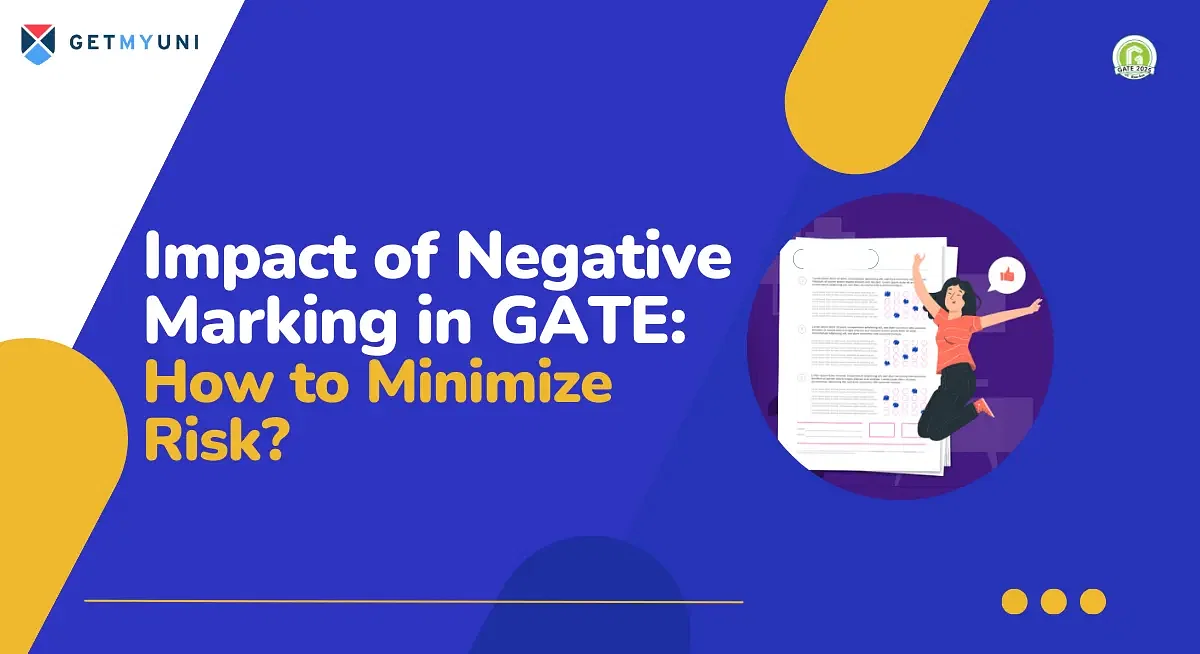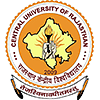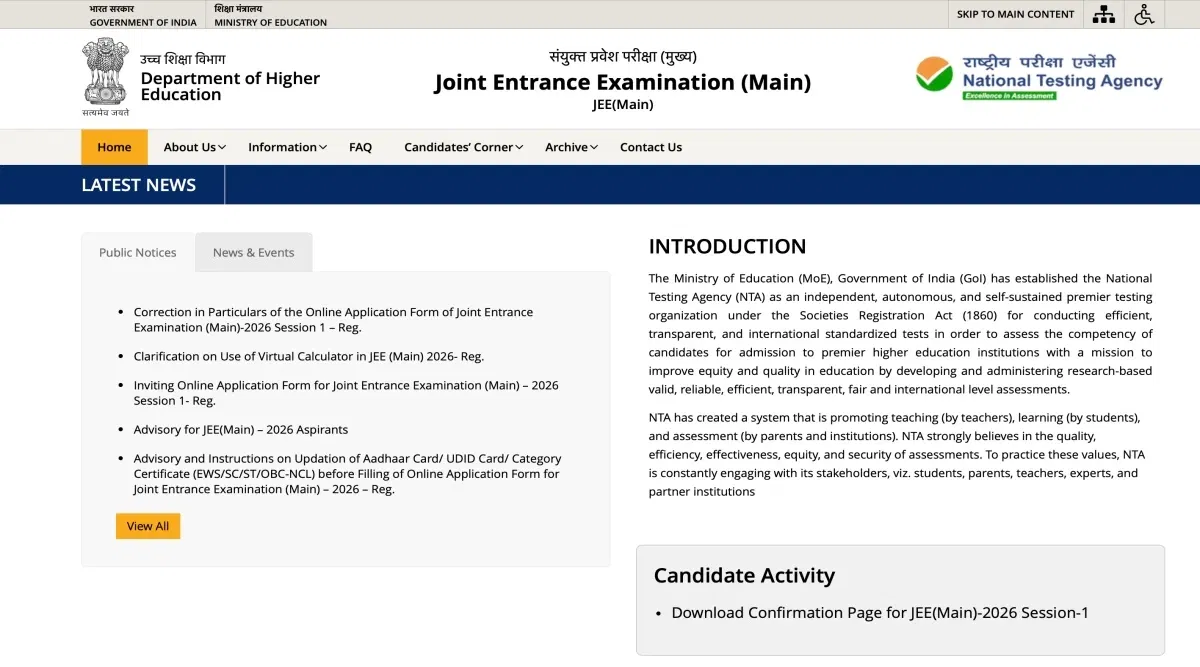GATE negative marking impacts the candidate's overall GATE result as 1/3rd and 2/3rd marks are deducted for 1 and 2 marks MCQs. Candidates must solve the previous year's GATE questions and use elimination techniques to minimize risk.
Table of Contents
The impact of negative marking in GATE can be a boon and a bane for candidates. While ⅓ and ⅔ marks are deducted to maintain healthy competition, it can cost admission to IITs for candidates.
GATE is one of the toughest exams in the world to crack. The GATE question paper is often set to assess candidates' expertise, skills, and knowledge in their respective fields, including engineering, and other sciences.
Therefore, the chances of negative marking in GATE are high. However, candidates can minimise the risk of negative marking in the GATE exam by implementing elimination techniques, regularly practising GATE past year questions, avoiding silly mistakes and more.
GATE 2025 Marking Scheme and Exam Pattern
Before beginning to understand the impact of negative marking in the GATE exam, it’s crucial to understand the GATE 2025 exam pattern and marking scheme. This will allow the candidates to evaluate the intensity of the impact of the marking scheme on their GATE results.
The following tables provide an overview of the GATE 2025 exam pattern and marking scheme:
GATE 2025 Exam Pattern
|
Particulars |
Details |
|
Examination Mode |
Computer Based Test |
|
Language |
English |
|
Duration |
3 hours (180 minutes) |
|
Sections |
General Aptitude (GA) + Selected subject |
|
Type of Questions |
Multiple Choice Questions (MCQs) Multiple Select Questions (MSQs) Numerical Answer Type (NAT) Questions |
|
Distribution of Marks in all Papers EXCEPT papers AR, CY, DA, EY, GG, MA, PH, ST, XH and XL |
General Aptitude: 15 marks Subject Questions: 72 marks Engineering Mathematics**: 13 marks (**XE includes Engineering Mathematics section XE-A of 15 marks) |
|
Distribution of Marks in papers AR, CY, DA, EY, GG, MA, PH, ST, XH and XL |
General Aptitude: 15 marks Subject Questions: 85 marks |
|
Test of Abilities |
Recall, Comprehension, Application, Analysis & Synthesis |
GATE 2025 Marking Scheme
|
Particulars |
Details |
|
Types of Questions |
1 mark MCQs 2 mark MCQs MSQs NAT questions |
|
Negative Marking |
For a 1-mark MCQ: 1/3rd mark deduction for a wrong answer. For a 2-mark MCQ: 2/3rd mark deduction for a wrong answer. For MSQs and NAT questions: NO negative marking for wrong answer(s) NO partial marking in MSQ. |
|
Total Number of Questions |
65 Questions, including 10 questions from General Aptitude |
|
Total Marks |
100 Marks |
Also Read: GATE Preparation Strategy for Non-Engineering Background Students
Is GATE Negative Marking Important?
Negative marking can be useful in many aspects. The following are some of the reasons why GATE negative marking can be important:
- It ensures that the candidates only attempt the questions that they are sure about, minimising the chances of guessing the answers and improving the accuracy of responses.
- Negative marking in GATE offers candidates marks only for their knowledge and helps them grasp the subject area by utilizing negative marking.
- The negative marking helps evaluate and compare the performance of candidates. It assesses the aspirants’s ability to answer accurately and avoid the incorrect ones.
- Negative marking in GATE also ensures that the candidates are thoroughly prepared for the examination. When they fear losing marks for incorrect answers, they prepare accordingly and have a strong understanding of the topics covered in the exam.
Yes, a negative marking in GATE is crucial, given the scale and level of the exam. However, it can be considered as a wrong practice due to its many repercussions.
The impact of negative marking in GATE increases the difficulty level of the exam and competition among the test takers. Moreover, Candidates have to begin their GATE preparation at least 2 years before the exam day, causing stress and anxiety among them.
Also Read: Avoid These 9 Common Mistakes in GATE Preparation 2025
How to Minimize the Impact of GATE Negative Marking?
Now, that the candidates are aware of both the negative and positive impacts of negative marking in GATE 2025 exam, it is time to understand how can one minimize the chances of getting wrong answers.
How to Avoid Negative Marking in GATE During Preparation?
To avoid the impact of GATE negative marking, candidates can follow the below-mentioned practices during their GATE preparation:
- Practice more to improve your accuracy:
As the saying goes “Practice makes perfect”; the consistent and dedicated practice of GATE exam questions can ensure improved accuracy of the candidate in answering the questions. When met with a similar pattern of questions, candidates can avoid repeating mistakes, thus, enhancing the speed and accuracy to answer the questions.
- Consistently Solve GATE previous year's question papers:
Solving the GATE previous year question papers allows the candidates to have a look at the nature of questions asked over the years, identify the repetitive questions and topics, and understand their pain points. This practice can ensure that they are well-prepared for the topics they lack.
- Appear for GATE mock tests:
GATE mock tests are a duplicate of the actual exam. They are designed to provide an idea of the type of questions asked in the real test. By appearing in the GATE mock exam candidates can anticipate the topics and questions asked in the upcoming exam and revise those questions properly.
How to Avoid Negative Marking in GATE on Exam Day?
The tussle doesn’t end with GATE preparation, the way of tackling questions on the GATE exam day can also make a difference. Here’s how to minimize the impact of negative marking in GATE on exam day:
- Candidates must attempt only those questions that they are confident about. This practice helps ensure marks on the exam. Guessing the answers is never an option.
- Candidates must manage time effectively on GATE exam day to answer all the questions without a rush. Even if they are not sure of the answer to any question, they must have enough time to revisit them and find a solution.
- Candidates must implement the elimination technique to answer difficult questions. Since the guessing game is risky, the elimination method helps remove the odd one out, and one is presented with the right answer.
- Do not make silly mistakes at any cost as it can make an entire question stand wrong.
- It is advisable that the candidates cross-verify the answers all the answer either just after completing the question or at the end of the exam.
Also Read: Impact of GATE Score on Higher Education Abroad
The impact of negative marking in GATE can both be positive and negative. Candidates have to prepare well in advance to minimize the risk of negative marking. They can utilise elimination techniques, practice sample questions and more to do so.








![Indian Institute of Technology, [IIT] Bombay](https://media.getmyuni.com/azure/college-image/small/indian-institute-of-technology-iit-bombay.jpg)

![Indian Institute of Technology, [IIT] Kanpur](https://media.getmyuni.com/azure/college-image/small/indian-institute-of-technology-iit-kanpur.jpg)
![Indian Institute of Technology, [IIT] Kharagpur](https://media.getmyuni.com/azure/college-image/small/indian-institute-of-technology-iit-kharagpur.jpg)





























POST YOUR COMMENT